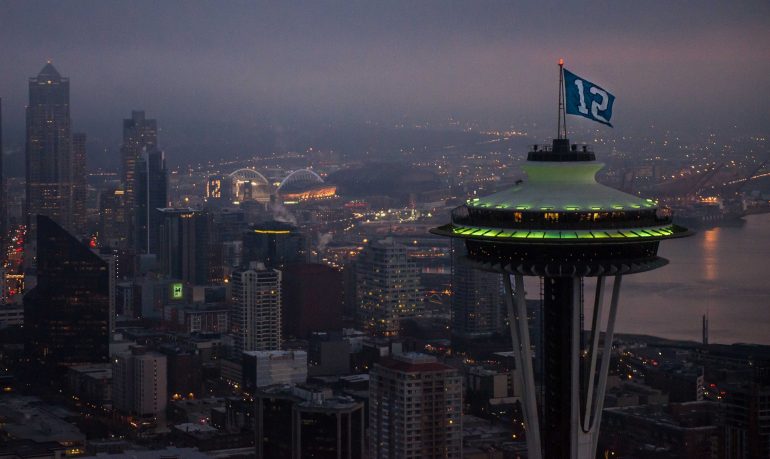

The image of Russell Wilson throwing an interception in the direction of Ricardo Lockette inside the 1 yard line to end the Seahawks Super Bowl hopes is still fresh in the minds of fans across the league. It is a convenient joke for many, and a painful memory for Seattle fans. John Schneider responded to that disappointment by given Pete Carroll the best red zone arsenal in the NFL. That may sound like hyperbole. It is not. Consider that since 2012, no player in the NFL has caught more red zone touchdown passes than Jimmy Graham (28) and no player has more red zone rushing touchdown than Marshawn Lynch (32). Who is laughing now?
The rich get richer
| Rk | G | TD | |
| 1 | Marshawn Lynch | 63 | 56 |
| 2 | Dez Bryant | 63 | 50 |
| 3 | Jimmy Graham | 63 | 46 |
| 4 | Rob Gronkowski | 49 | 45 |
| 5 | Arian Foster | 50 | 44 |
| 6 | Jordy Nelson | 60 | 43 |
| 7 | Calvin Johnson | 59 | 41 |
| 8 | LeSean McCoy | 59 | 41 |
| 9 | Jamaal Charles | 48 | 40 |
| 10 | Demaryius Thomas | 59 | 39 |
Graham and Lynch have combined 102 touchdowns in that time, or 25.5 per season. That is easily the most potent duo in football. Demaryius Thomas and and Eric Decker are #10 and #11 and total 77 touchdowns, but they are not even on the same team anymore. Decker and Brandon Marshall are the second highest scoring pair with 75 touchdowns since 2011.
Before Seahawks fans get too far ahead of themselves with fuzzy math, it is not realistic to expect Graham and Lynch to sustain their pace as part of the same offense. Some of the touchdowns Lynch scores for Seattle will mean Graham will not, and vice versa. That does not diminish the dilemma facing opposing defenses.
Sitting dead red
Graham has caught 38 passes in the red zone since 2012. Nearly three-quarters of those (74%) have gone for touchdowns (28). Only Rob Gronkowski (20/26, 77%), Vernon Davis (13/16 81%) and Tim Wright (10/10, 100%) have been more efficient in turning their red zone touches into points. Davis and Wright are operating on far smaller scales. This is really a Gronk and Graham conversation.
Most Red Zone Touchdown Receptions Since 2012
| Rank | Player | Targets | Rec | Catch Rate | TD ▾ | TD/Catch |
| 1 | Jimmy Graham | 64 | 38 | 59.40% | 28 | 74% |
| 2 | Eric Decker | 65 | 41 | 63.10% | 24 | 59% |
| 3 | Brandon Marshall | 62 | 33 | 53.20% | 23 | 70% |
| 4 | Dez Bryant | 50 | 30 | 60.00% | 22 | 73% |
| 5 | Rob Gronkowski | 42 | 26 | 61.90% | 20 | 77% |
| 6 | Demaryius Thomas | 80 | 40 | 50.00% | 19 | 48% |
| 7 | Antonio Gates | 45 | 26 | 57.80% | 18 | 69% |
| 8 | James Jones | 47 | 31 | 66.00% | 18 | 58% |
| 9 | Julius Thomas | 33 | 27 | 81.80% | 17 | 63% |
| 10 | Torrey Smith | 44 | 23 | 52.30% | 16 | 70% |
Despite Decker showing up at second on the list with 24 red zone touchdowns, he lags behind players like Graham, Marshall, Dez Bryant, and Gronkowski in TD-to-catch ratio. The implication is that these bigger, more physical players, are optimally suited for red zone efficiency. Baldwin has eight red zone touchdowns during this period, good for 62nd on this list, but has only been able to convert 47% of his catches into scores. Golden Tate, a former Seahawks receiving threat, is even lower at a 36% scoring rate.
Graham will not see the same number of overall targets in this run-centric Seahawks offense, but Seattle is far more likely to throw the ball in the red zone. Seattle has passed on 54% of their red zone plays since 2012, according to Pro-Football-Reference.com. That ranks 25th in the NFL, with the Chargers being the most pass heavy (79%).
The Seahawks might not be breaking any passing records down there, but it is a significant shift from their personality outside overall, where they have ranked either first or second in percentage of run plays for the last three seasons. Graham should expect to get the majority of throws once the team reaches the red zone.
His biggest competition may come from Lynch who has seven red zone touchdown receptions of his own, to go along with 32 rushing touchdowns.
Most Red Zone Rushing Touchdowns Since 2012
| Rank | Player | TD ▾ |
| 1 | Marshawn Lynch | 32 |
| 2 | DeMarco Murray | 25 |
| 3 | Alfred Morris | 23 |
| 4 | Arian Foster | 23 |
| 5 | Stevan Ridley | 21 |
| 6 | Cam Newton | 19 |
| 7 | Eddie Lacy | 19 |
| 8 | Matt Forte | 18 |
| 9 | Jamaal Charles | 17 |
| 10 | Joique Bell | 17 |
Russell Wilson shows up at #36 on this list with 9 red zone rushing touchdowns since his rookie season. That is sure to create a triple threat that will leave middle linebackers, safeties, and defensive coordinators sucking their thumbs. Super Bowl sensation Chris Matthews, all 6’5″ of him, figures to become a factor as well.
Run to win, pass to score
The old football adage may be modified this year to: run to score, pass to score, win a lot. This is a Seahawks team that has ranked 16th, 14th and 20th in red zone efficiency the last three seasons. Wilson has ranked 3rd, 14th, and 13th in red zone passer rating during that same time.
They have averaged 57 red zone possessions per season, and are converting about 53% of those possessions into touchdowns. The top red zone teams in football are usually around 70%. The addition of Graham and Matthews, the maturation of Wilson, and a still devastating Lynch would seem to make a climb to at least 60% red zone efficiency a realistic expectation.
That would amount to a difference of four additional touchdowns, or almost two more points per game for Seattle. Should they push toward the top of the league in red zone efficiency at 70%, they would add 10 more touchdowns and over four more points per game. Everything else could simply stay the same, and just this increase red zone touchdown rate would turn Seattle into a top four scoring offense in football.
One of the sports worst red zone mistakes may have led to one of the best red zone offenses. Schneider does not play around.

